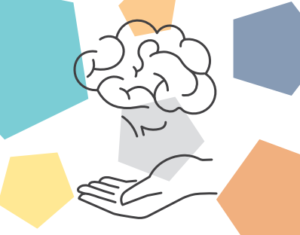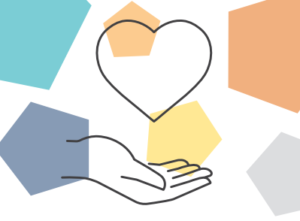Heart Work and Head Work: A Conversation About Relationships, Self-Awareness, and Evidence Based Practice
A conversation on heart work and head work between Debbie Okrina, LCSW, and Beth Gerlach, Ph.D., LCSW, Associate Director, Texas Institute for Child & Family Wellbeing, Steve Hicks School of Social Work, UT Austin
Debbie: As a social worker, I’m interested in research. I love reading, learning and gaining new perspectives. But I have to admit that as a clinician, I have felt frustrated with the focus on evidence based practice. I think the intention is noble. And I am all for effective practice. But I’m not convinced that evidence-based practice models lead to quality or even effectiveness. My experience in 20 years of practicing therapy and clinical supervision is that it is first and foremost about relationships.
Beth: As a clinician and researcher, I totally agree! I am often concerned that the reliance on using evidence based programs and practice, especially when mandated by someone without clinical expertise, oversimplifies the likelihood for positive outcomes and change. Yes, ideally we want to provide services that have been demonstrated to work for a similar population with similar presenting issues – but that does not replace the therapeutic relationship as the key mechanism to deliver those services. In fact, most research on therapeutic interventions acknowledges that the relationship accounts for treatment outcomes at least as much as the particular treatment method.
Debbie: One of the most significant factors I’ve seen in creating a safe relationship for therapy is the therapist doing their own work. In order to have the capacity to attune to clients and create a safe relationship for healing, the therapist must be aware of her own past hurts, shame triggers and other barriers that take her out of connection.
I’ve observed clinicians, myself included, staying in their heads, being task focused and sometimes focused on the evidence-based model so much that they miss the opportunity to connect emotionally with a client. They miss the “heart work” that creates a secure relationship between therapist and client to facilitate healing and understanding.
As a clinician, I often experience the need to “fix” my client. I want to have “the answer.” Our brains even reward us for having “the answer.” Sometimes focusing on the evidence-based model supports this part of me.
In order to engage in that heart work, the therapist has to be attuned to the client and to themselves. It seems like the focus on evidenced-based models can lead to the therapist remaining more in their head, thinking more about what to do next and how to apply the model. This can be more comfortable than working to get embodied, owning our own feelings and working outside of sessions on what comes up inside of us that needs healing which might be a barrier to connecting with clients.
 So, sometimes the focus on evidenced-based models can result in therapists remaining more in their head. I have observed that those of us who have college degrees, including therapists, are often more comfortable with thinking than feeling. We value data. If we could just find the answer, we believe we would be successful. But when we overly rely on the “head work”, we run the risk of losing the “heart work.” Maybe this affects researchers too?
So, sometimes the focus on evidenced-based models can result in therapists remaining more in their head. I have observed that those of us who have college degrees, including therapists, are often more comfortable with thinking than feeling. We value data. If we could just find the answer, we believe we would be successful. But when we overly rely on the “head work”, we run the risk of losing the “heart work.” Maybe this affects researchers too?
Beth: Absolutely! That said, I have also felt frustration when I know an intervention is making a difference for clients, but am struggling to determine how to best measure and collect data to provide the evidence. Sometimes the outcomes we measure for impact are hard to operationalize and observe (like did resilience improve? Did we prevent child abuse?). One way to address this is for clinicians and researchers to work together closely to develop an evaluation plan. Clinicians hold the expertise on the work that is occurring through the therapeutic relationship. In addition to specific client outcomes, evaluations can include measures of therapeutic alliance, use of quality supervision, clinician perspective, client feedback, adaptations to models based on client or clinician characteristics and additional strategies used beyond a specific model to compliment services.
Including measures such as these can enhance the usefulness of the evidence supporting a practice model or intervention. One of the most significant criticisms of the focus on evidence-based practice is that just because an intervention was able to demonstrate positive outcomes during an evaluation or trial, it is not necessarily easy to replicate in a “real-world” setting with a different set of client characteristics and clinician expertise. Thus, evaluations that include the most comprehensive understanding of all the “head work” and “heart work” that can impact outcomes could be more useful for the field in using evidence to determine the best fit for a client and a clinician.
All of this speaks to the importance of strong partnerships between researchers and clinicians. Researchers need to listen to clinicians in order to better articulate the essential skills needed within the clinician and client relationship to deliver the specific intervention. While understanding processes like fidelity and dosage are important, including baseline information about engagement, trust and therapeutic alliance could help us all understand how clinician expertise in authentic relationships can work in partnership with specific strategies offered by an intervention model.
Debbie: I agree with you. And I’m inspired by this conversation. I look forward to creative new ways to measure these important concepts. Now it seems obvious to me that cultivating relationships between clinicians and researchers is a beautiful way to make sure the focus on relationship doesn’t get lost. I have to admit that sometimes I stereotype researchers as being more in their head, but when I take some time to know them, it is usually so clear that they followed their heart into this work. I look forward to partnerships that help us improve the ways we heal ourselves, our clients and our communities.
|
Additional Reading
|
